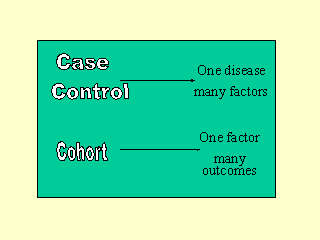 |
These studies are especially good for the small groups of people
who have had a specific exposure—at work, etc.—for whom a control
group of otherwise similar people (but without the exposure) can
be assembled. The data at entry need to be good, and all the
people assembled at the start need to be followed up (or very
nearly all) and measured at the end for these studies to be good.
If so, they can be even more convincing than the case control
studies.
Whereas case control studies can compare a disease with many
factors (e.g., lung cancer with smoking, occupational exposure
and air pollution), cohort studies can compare one factor with
many outcomes (e.g., smoking with lung cancer, laryngeal cancer,
heart attacks, etc.) Allowance can also be made statistically
for other factors about which data were collected.
|
